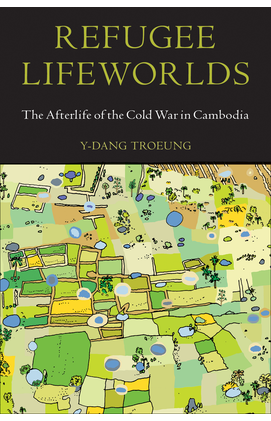Harry J. Benda Prize
The Harry J. Benda Prize of the AAS is given annually to an outstanding newer scholar from any discipline or country specialization of Southeast Asian studies for a first book in the field. The award, which honors one of the pioneers in the field of Southeast Asian studies, has been presented since 1977.
2025 Prize
$1,000 to the author.
Guidelines for Submission
- Original, scholarly, nonfiction works in English with a copyright date of 2022 or 2023 are eligible for the 2025 prize.
- Reference works, exhibition catalogs, translations, textbooks, essay collections, poetry, fiction, travel books, memoirs, or autobiographies are not eligible.
- Publishers must complete the book nomination form. Each press may nominate a maximum of six books for the Benda Prize.
- Only publishers may nominate books.
- Upon receipt of a completed nomination form, publishers will be provided with addresses for prize committee members. A copy of each entry, clearly labeled “Benda Prize,” must be sent to each member of the committee.
Books published by the Association for Asian Studies, Inc. are ineligible for consideration for prizes administered by the Association for Asian Studies. Employees of the Association are excluded from consideration for AAS book prizes, subventions, and grants. Publishers should check with authors to certify that they are not employed by the Association for Asian Studies, Inc.
Deadline
The nomination deadline is June 30, 2024. Nominations will open for submission later in spring 2024.
Benda Prize Committee
Christina Schwenkel (Chair)
University of California, Riverside
Taomo Zhou
Nanyang Technological University
Alice Beban
Massey University
2024 Awards
Winner and Citation

Kristian Karlo Saguin, Urban Ecologies on the Edge: Making Manila’s Resource Frontier (University of California Press)
Urban Ecologies on the Edge offers an innovative and theoretically groundbreaking perspective on the production and maintenance of new resource frontiers on the edge of a rapidly expanding city in the Global South. Using the case study of Laguna Lake in Metro Manila, Saguin demonstrates with methodological versatility the dynamic relationship between economic development and environmental management as diverse stakeholders attempt to access and control commodity flows within chains of urban provisioning. Through meticulous storytelling, the book artfully traces the intertwined socioecologies of floods, food, fish, fisherfolk, and infrastructures. With precision and clarity, it reveals how human and nonhuman actors contend for diverse and increasingly exhausted resources, while confronting risk and precarity that manifest in conflicting visions of the future sustainability of the lake and surrounding city.
Honorable Mention

Past Awards
Harry J. Benda Prize
The Harry J. Benda Prize originated in 1977 as a biennial award to a young scholar in recognition of the promise shown in their entire body of work. From 1991 onward, the Benda Prize has been given annually as a book award.
1977 Sartono Kartodirdjo
1979 Lim Teck Ghee
1981 Huynh Sanj Thong
1983 Renato Rosaldo
1985 Reynaldo C. Ileto
1987 Victor B. Lieberman
1989 Chandra Muzzafar
1991 Ward Keeler, Javanese Shadow Plays, Javanese Selves
1992 Ann Laura Stoler, Capitalism and Confrontation in Sumatra’s Plantation Belt, 1870-1979
1993 Not awarded
1994 Anna Lowenhaupt Tsing, In the Realm of the Diamond Queen: Marginality in an Out-of-the-Way Place
1995 Thongchai Winichakul, Siam Mapped: A History of the Geo-body of a Nation
1996 Janet Hoskins, The Play of Time: Kodi Perspectives on Calendars, History, and Exchange
1997 Nancy Florida, Writing the Past, Inscribing the Future: History as Prophecy in Colonial Java
1998 Kenneth George, Showing Signs of Violence
1999 Laurie Sears, Shadows of Empire: Colonial Discourse and Javanese Tales
2000 Suzanne April Brenner, The Domestication of Desire: Women, Wealth, and Modernity in Java
2001 Annella Cannell, Power and Intimacy in the Christian Philippines
2002 Mark Bradley, Imagining Vietnam and America
2003 Peter Zinoman, The Colonial Bastille: A History of Imprisonment in Vietnam, 1862-1940
2004 William Cummings, Making Blood White: Historical Transformations in Early Modern Makassar
2005 Andrew Hardy, Red Hills: Migrants and the State in the Highlands of Vietnam
2006 Mary Callahan, Making Enemies: War and State Building in Burma
2007 Eric Tagliacozzo, Secret Trades, Porous Borders: Smuggling and States along the Southeast Asian Frontier, 1865-1915
2008 Matthew Cohen, The Komedie Stamboel: Popular Theatre in Colonial Indonesia, 1891-1903
2009 Penny Edwards, Cambodge: The Cultivation of a Nation, 1860-1945
2010 Justin Thomas McDaniel, Gathering Leaves and Lifting Words: Histories of Buddhist Monastic Education in Laos and Thailand
2011 Jeffrey Hadler, Muslims and Matriarchs: Cultural Resilience in Indonesia through Jihad and Colonialism
2012 Karen Strassler, Refracted Visions: Popular Photography and National Modernity in Java
2013 Ronit Ricci, Islam Translated: Literature, Conversation and the Arabic Cosmopolis of South and Southeast Asia
2014 Erik Harms, Saigon’s Edge: On the Margins of Ho Chi Minh City
2015 Charles Keith, Catholic Vietnam: A Church from Empire to Nation
2016 Ann Marie Leshkowich, Essential Trade: Vietnamese Women in a Changing Marketplace
2017 Kimberly Kay Hoang, Dealing in Desire: Asian Ascendancy, Western Decline, and the Hidden Currencies of Global Sex Work
2018 Rachel Leow, Taming Babel: Language in the Making of Malaysia
2019 Doreen Lee, Activist Archives: Youth Culture and the Political Past in Indonesia
2020 Sumit Mandal, Becoming Arab: Creole Histories and Modern Identity in the Malay World
2021 Christian C. Lentz, Contested Territory: Điện Biên Phủ and the Making of Northwest Vietnam
2022 Teren Sevea, Miracles and Material Life: Rice, Ore, Traps and Guns in Islamic Malaya
2023 Alice Beban, Unwritten Rule: State-Making through Land Reform in Cambodia; Honorable Mention, Lukas Ley, Building on Borrowed Time: Rising Seas and Failing Infrastructure in Semarang

